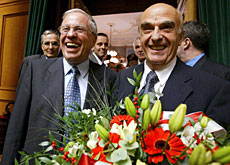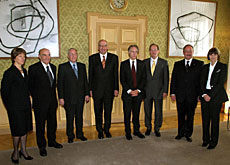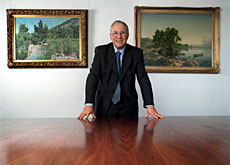Switzerland braced for Blocher shockwave

Christoph Blocher’s election to the Swiss cabinet has rattled much of the Swiss establishment and is likely to complicate relations with the European Union.
The rightwing Swiss People’s Party was rewarded for its success in October’s parliamentary election with a second cabinet seat.
Blocher, the outspoken leader of the party’s Zurich branch, replaces the Christian Democrat minister, Ruth Metzler.
Blocher is known for his opposition to the EU and his hardline attitude on asylum. His presence in the cabinet, along with the conservative Radical, Hans-Rudolf Merz – who was also elected on Wednesday – is expected to push the government further to the right.
New approach
Fribourg-based political analyst Jeremias Blaser warned that Blocher’s populist style could spell a new, aggressive style of government politics in Switzerland.
“Policies of destabilisation and populism have always been the two main aspects of rightwing politics,” Blaser told swissinfo.
“And if you look at history you can see what kind of outcomes we have to expect – a new, much more aggressive political style, further cuts in public services, further privatisation and a regression in environmental policy.”
He said there were also question marks over how Blocher – who has been a strident critic of the government – would fit into the cabinet.
“He was, and still is, a politician who for 15 years has systematically discredited all the political institutions – parliament, the government, the Federal Court.”
Clive Church, a British expert on Swiss politics, said there was a danger Blocher’s election would be viewed negatively in Europe and could be interpreted as a sign of the rise of the Far Right.
Image problem
“People tend to see the People’s Party as being a bit like [Jörg] Haider’s [Austrian rightwing Freedom] party and the smaller xenophobic parties. And even though this is really only a very partial truth, it won’t help the country’s image,” Church told swissinfo.
He added that having Blocher in the cabinet could also hamper negotiations with the EU over a new set of bilateral accords.
“I suppose it could make Brussels feel that Switzerland is even less likely to join the EU than it was before,” Church said, “so I can’t imagine this is going to make Switzerland’s job easier in Europe.”
Blaser agrees that Blocher could complicate Swiss-EU relations. “Blocher was always against the EU, so the chances of getting a good outcome of the negotiations currently underway are dropping again.”
Two become one
Metzler’s departure reduces the number of women in the cabinet from two to one.
Blaser said this could be seen as “another sign that there’s a clear rightwing tendency in parliament”.
“Rightwing parties have never pushed for equal representation of men and women in politics,” he commented.
Blaser said it was the first time in 130 years that a cabinet member had failed to be re-elected.
swissinfo, Morven McLean
The newly elected Swiss cabinet:
Moritz Leuenberger (Social Democrats)
Pascal Couchepin (Radicals)
Christoph Blocher (People’s Party)
Joseph Deiss (Christian Democrats)
Samuel Schmid (People’s Party)
Micheline Calmy-Rey (Social Democrats)
Hans-Rudolf Merz (Radicals)

In compliance with the JTI standards
More: SWI swissinfo.ch certified by the Journalism Trust Initiative


You can find an overview of ongoing debates with our journalists here. Please join us!
If you want to start a conversation about a topic raised in this article or want to report factual errors, email us at english@swissinfo.ch.